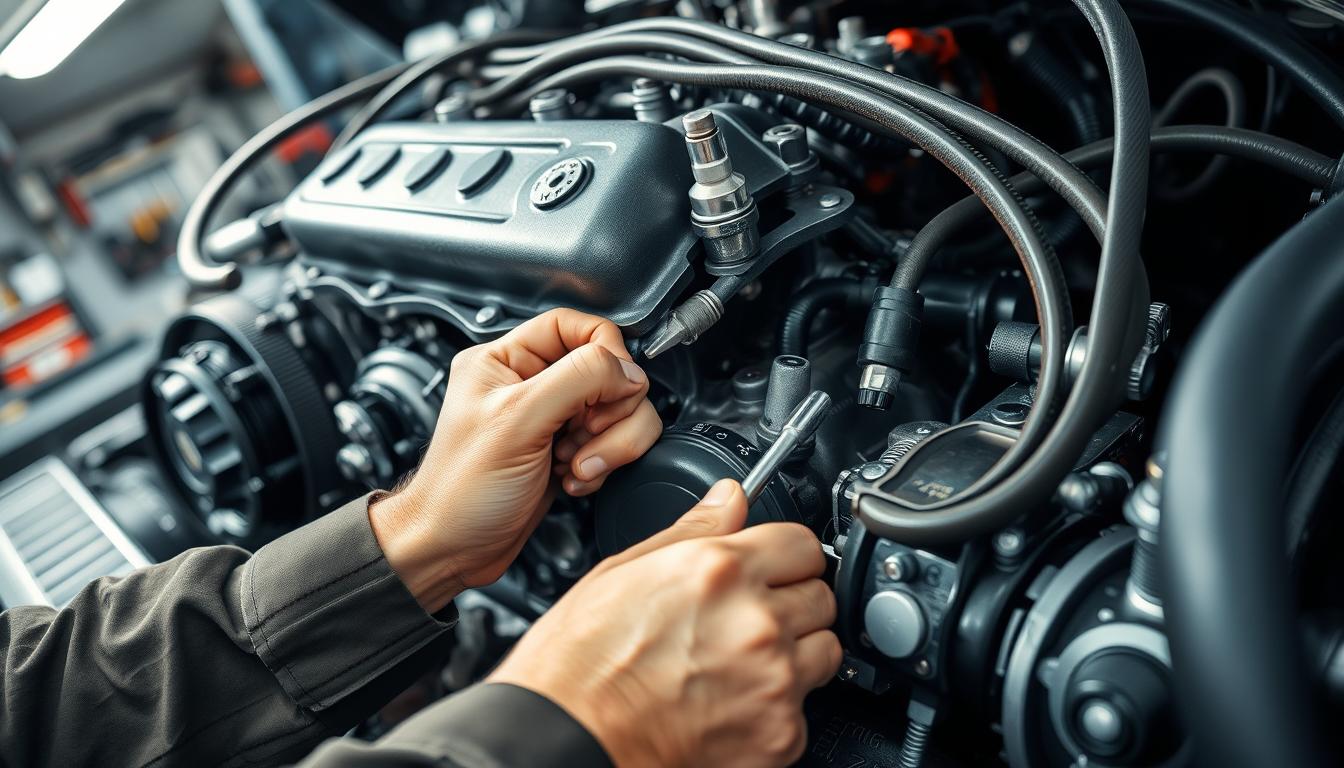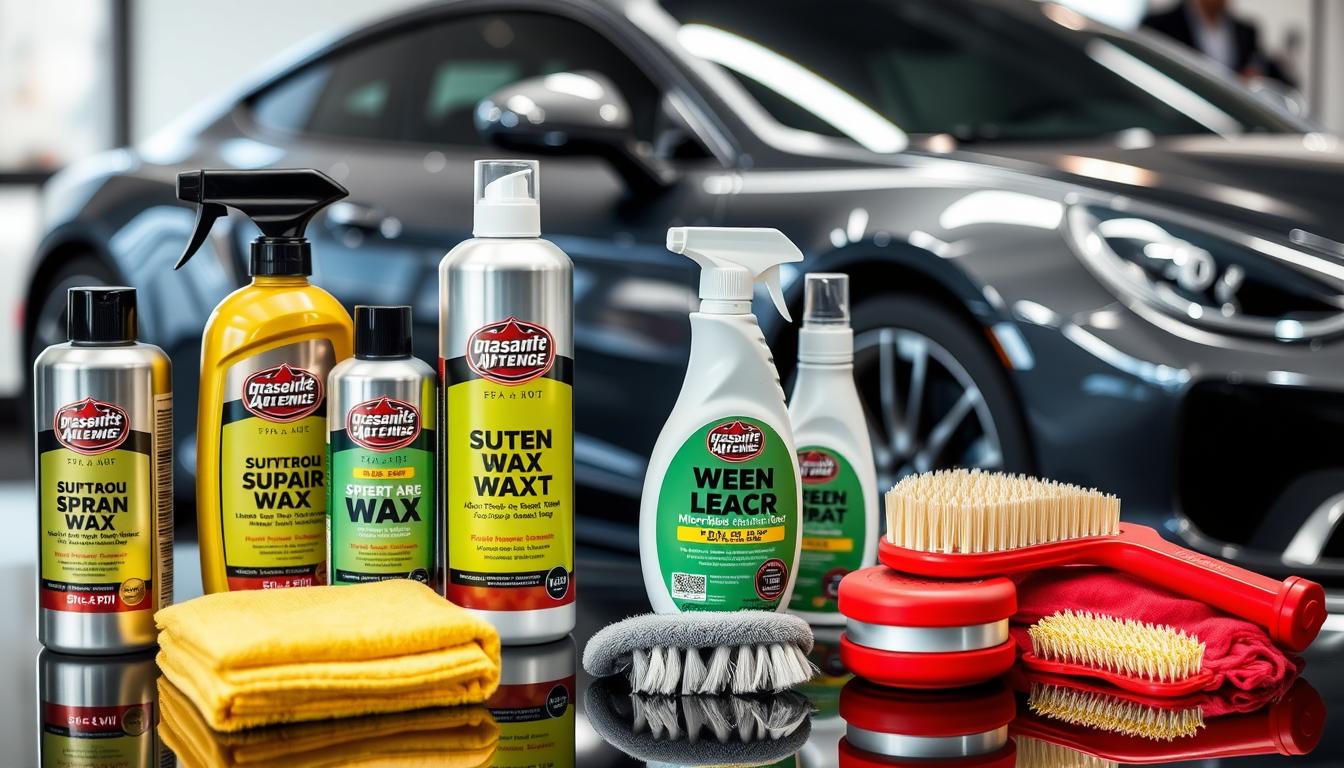As car owners, we know how vital regular engine tune-ups and checks are. They keep our vehicle running well, saving fuel and lasting longer. By sticking to a maintenance schedule, our car stays in top shape.
Regular oil changes, for example, extend engine life by lubricating parts and reducing friction. This makes our engine run smoothly and saves fuel costs. Engine tune-ups also ensure our engine performs at its best by checking and replacing parts like spark plugs and air filters.
By focusing on regular engine tune-ups and checks, we catch problems early. This prevents unexpected breakdowns and costly repairs. In this article, we’ll delve into why regular engine tune-ups and checks are key. We’ll offer car care guides and maintenance schedules to help you keep your vehicle in great shape.
Key Takeaways
- Regular engine tune-ups and checks are essential for maintaining our vehicle’s performance, efficiency, and reliability.
- Regular oil changes can prolong engine life and improve fuel efficiency.
- Engine tune-ups maintain optimal performance by checking and replacing parts like spark plugs, air filters, and fuel filters.
- Regular engine tune-ups and checks can detect potential issues early, saving us from unexpected breakdowns and expensive repairs.
- Consistent engine maintenance, including tune-ups, extends the vehicle’s lifespan and reduces the risk of major failures.
- Regular engine tune-ups can improve fuel economy and reduce driving costs.
Understanding Engine Tune-Ups
Keeping our vehicles in top shape is key. A vehicle performance check is vital. It involves checking and replacing important parts to keep the engine running well. Regular routine engine inspections help spot worn-out parts and other issues before they cause trouble.
During an auto service tune-up, skilled technicians check and swap out spark plugs, air filters, and fuel filters. They also look at ignition systems, PCV valves, and fluid levels. This ensures our cars run well, last longer, and use less fuel and produce fewer emissions.
Signs your car might need a tune-up include poor fuel efficiency, hard starts, rough idling, and odd noises. Cars should get routine engine inspections every 30,000 miles or two years. Regular auto service tune-ups mean smoother rides and a longer engine life.
| Tune-Up Services | Benefits |
|---|---|
| Spark plug replacement | Improved engine performance |
| Air filter replacement | Increased fuel efficiency |
| Fuel filter replacement | Reduced engine wear and tear |
Benefits of Regular Tune-Ups
Regular engine tune-ups are key to keeping our vehicles running well. They help our engines perform better and last longer. This means we get a smoother ride, better fuel use, and save on maintenance costs.
Regular tune-ups also help the environment. They make our cars use less fuel and produce fewer emissions. This is good for our planet and helps us be more sustainable.
Some main benefits of regular tune-ups are:
- Improved fuel efficiency, leading to cost savings on fuel
- Extended engine lifespan, reducing the need for costly repairs
- Enhanced performance and efficiency, resulting in a smoother ride and better acceleration
- Reduced emissions, contributing to a cleaner environment
By making tune-ups a regular part of our car care, we avoid breakdowns and accidents. Skilled technicians can fix problems during tune-ups, preventing more damage. It’s crucial to keep up with tune-ups for the best performance and safety.
Regular tune-ups also make our cars more valuable when we sell them. Well-kept cars get higher prices. So, by focusing on tune-ups, we enjoy a car that runs well, is good for the environment, and holds its value.
How Often Should We Tune-Up?
Car engine care is key, and following the recommended schedule is essential. Regular tune-ups are vital for checking vehicle performance and engine health. The tune-up frequency varies based on the car’s make and condition.
Older cars need tune-ups every 12,000 miles or yearly, especially if they have non-electronic ignitions. Newer cars with electronic ignitions can go up to 25,000 miles without a tune-up. Spark plugs usually last about 60,000 miles before needing a change. Regular tune-ups help keep your car running smoothly and prevent major issues.
Signs It’s Time for a Tune-Up
Watch for these signs that it’s time for a tune-up:
- Difficulty starting
- Frequent stalling
- Rough or jerky running
- Check engine light on
- Performance issues like slow acceleration
- Odd pinging or knocking noises
By following the manufacturer’s guidelines and recognizing these signs, we can keep our cars in top shape. This ensures they run well and last longer.
| Vehicle Type | Tune-Up Frequency |
|---|---|
| Older cars with non-electronic ignitions | Every 12,000 miles or once a year |
| Newer cars with electronic ignitions | Every 25,000 miles |
Common Tune-Up Procedures
Auto service tune-ups include several key steps to keep our car’s engine running well. Regular tune-ups can spot problems early, saving us money and time. They help our car run smoothly and efficiently.
Some important tune-up tasks are replacing spark plugs, changing air filters, and cleaning the fuel system. These steps are crucial for our engine’s performance. For instance, new spark plugs can make our car more fuel-efficient and cut down on emissions. Also, swapping out air filters can boost engine performance and make our car last longer.
Here are some key tune-up procedures to consider:
- Spark plug replacement: This can help improve fuel efficiency and reduce emissions.
- Air filter changes: This can help improve engine performance and extend the life of our car’s engine.
- Fuel system cleaning: This can help remove deposits and contaminants from the fuel system, improving engine performance and efficiency.
Regular engine tune-ups can also help us find problems before they get big. By checking things like battery voltage and engine vacuum, we can keep our car running right. This also helps us meet emissions standards.
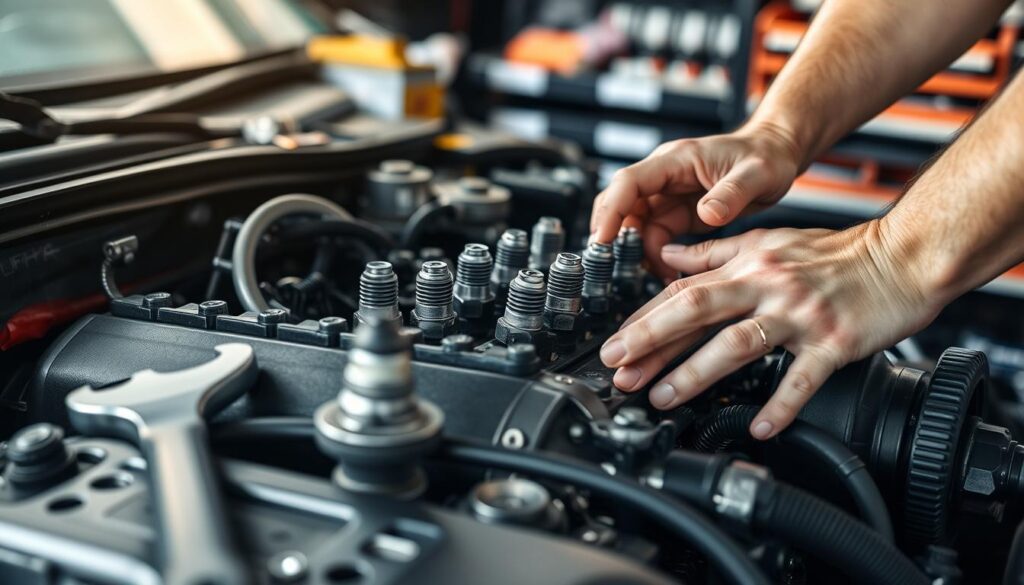
By adding these tune-up steps to our car care routine, we can make our engine last longer. We’ll also use less fuel and avoid costly repairs. Remember, regular tune-ups are key to keeping our car in top shape and saving us money over time.
| Tune-Up Procedure | Benefits |
|---|---|
| Spark Plug Replacement | Improved fuel efficiency, reduced emissions |
| Air Filter Changes | Improved engine performance, extended engine life |
| Fuel System Cleaning | Improved engine performance, increased fuel efficiency |
The Role of Engine Checks
Regular engine checks are key to keeping our vehicles running well. They help us spot problems early, before they get worse. This keeps our engines in great shape, ensuring they perform at their best and avoid breakdowns.
It’s important to follow a car maintenance schedule that includes tune-ups and engine checks. These services help reduce engine wear and improve fuel efficiency. They also prevent engine damage. By taking care of our engines, we boost our vehicle’s performance, cut down on emissions, and help the environment.
- Diagnostic tests to identify potential issues
- Visual inspections to detect signs of wear and tear
- Regular oil changes to reduce engine wear and improve fuel efficiency
By making these checks a regular part of our car care, we ensure our vehicles are safe and efficient. Regular engine checks catch small problems early, saving us money in the long run.
By focusing on engine diagnostics and health assessments, we keep our engines running smoothly. This improves our driving experience, makes the roads safer, and helps the environment.
How Tune-Ups Can Save Us Money
Regular engine tune-ups and checks are key to keeping our cars running well. They help our vehicles last longer and avoid expensive repairs. This is why regular tune-ups are so important for car engine care and maintenance.
Preventative maintenance helps avoid big repair bills. Small problems caught during a tune-up can prevent major failures. This means we don’t have to replace expensive parts like spark plugs and air filters as often.
Here are some benefits of regular tune-ups:
- Improved fuel efficiency, which can save us money at the pump
- Reduced emissions, which can help reduce our carbon footprint
- Improved engine performance, which can enhance our driving experience
- Extended engine lifespan, which can save us money in the long run
Regular engine tune-ups also help us avoid expensive repairs by catching problems early. By focusing on preventative maintenance, we get a smoother ride, better fuel economy, and lower maintenance costs. This shows how important regular tune-ups and engine maintenance are for our cars.
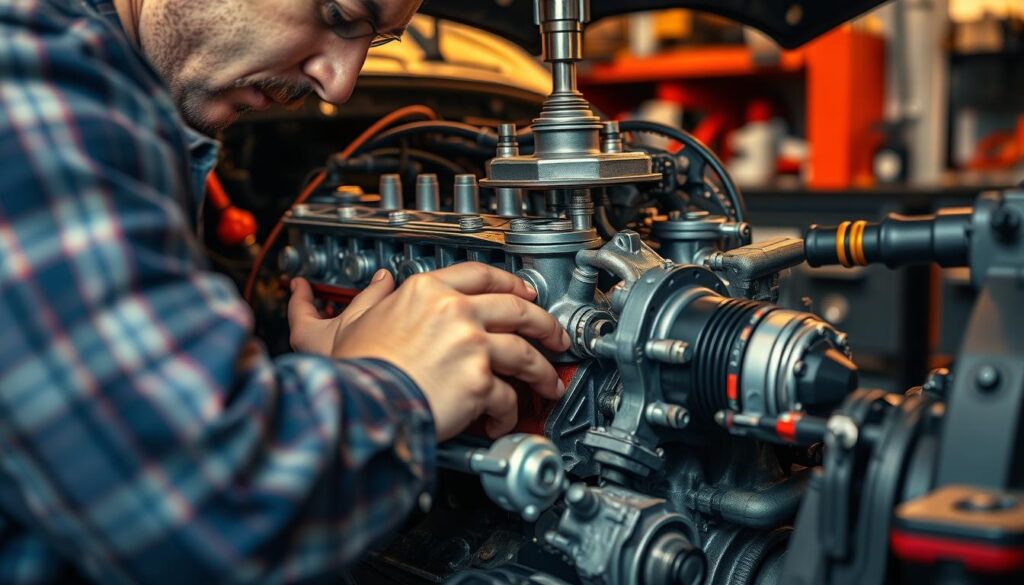
By investing in regular tune-ups and engine maintenance, our cars run better and last longer. This means we spend less on repairs and enjoy a better driving experience. It’s a smart way to save money, reduce our environmental impact, and have a more enjoyable drive.
| Benefits of Regular Tune-Ups | Importance of Engine Maintenance |
|---|---|
| Improved fuel efficiency | Extended engine lifespan |
| Reduced emissions | Improved engine performance |
| Improved engine performance | Reduced maintenance costs |
Impact on Fuel Economy
Regular checks and engine inspections boost fuel economy. Keeping our engines in good shape through tune-ups means better gas mileage and less pollution. The U.S. Department of Energy says a clean air filter can up gas mileage by 10%.
A Car Care Council study found that new spark plugs can increase fuel efficiency by 30%. Changing the fuel filter regularly stops up to 95% of engine contaminants. The Environmental Protection Agency (EPA) notes that correct timing adjustments can raise gas mileage by 2%.
Regular tune-ups offer many benefits:
- Improved gas mileage
- Reduced emissions
- Smother engine performance
- Increased vehicle longevity
By adding regular checks and engine inspections to our maintenance plans, we can keep our vehicles running well. This leads to better fuel economy and less pollution. As we focus on car care, we’ll see the perks of better fuel efficiency and cleaner emissions.
Regular engine tune-ups are key to cutting down harmful emissions. By maintaining our engines, we avoid big problems and extend engine life. With proper care and attention, we get better fuel efficiency and a smoother ride.
| Service | Benefit |
|---|---|
| Replace air filter | Improve gas mileage by up to 10% |
| Replace spark plugs | Improve fuel efficiency by up to 30% |
| Change fuel filter | Prevent up to 95% of contaminants from entering the engine |
When to Schedule an Engine Check
Thinking about our car engine care is key. We need to know when to get a vehicle performance check. Regular engine inspections keep our car healthy and prevent problems.
It’s a good idea to schedule an engine check before long trips or during seasonal changes. Extreme temperatures can harm our car’s performance.
A vehicle performance check can spot engine, transmission, or system issues. Fixing these problems early saves money and keeps our car running well. Regular routine engine inspections also make our car last longer and perform better.
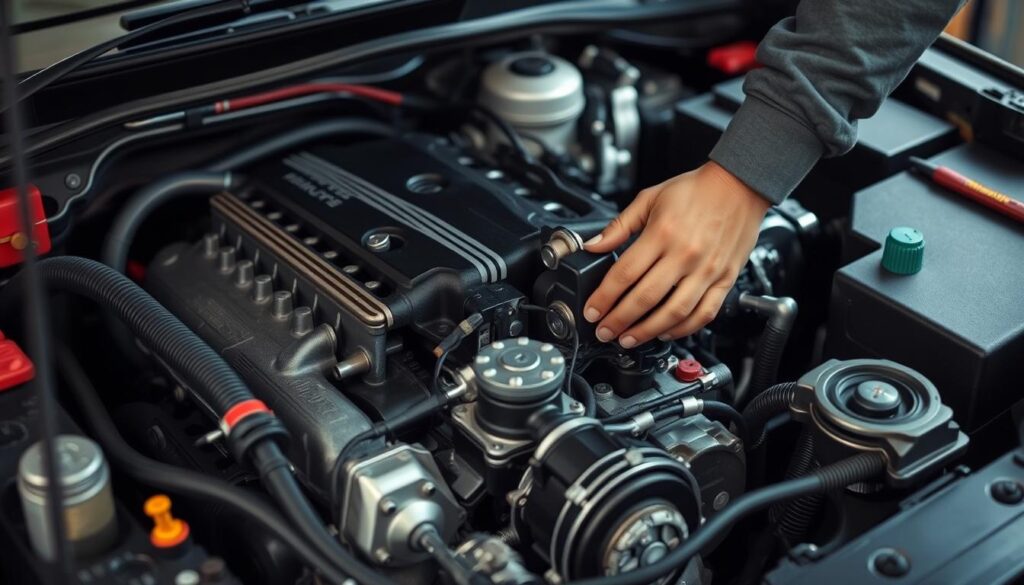
Just like we care for our car, we can improve our website. Making our website faster and more efficient boosts user experience and online presence. For tips on website optimization, check out website speed optimization resources.
| Service | Frequency | Cost |
|---|---|---|
| Tune-up | Every 10,000-12,000 miles | $200-$800 |
| Spark plug replacement | Every 30,000-100,000 miles | $40-$150 |
Professional vs. DIY Tune-Ups
When it comes to auto service tune-ups, we have two main options: seeking professional help or doing it ourselves. DIY tune-ups can save money and teach us a lot. But, sometimes, we need a pro’s help.
Regular engine maintenance is key for our vehicles to last long and run well. It’s not just about replacing parts. It’s about making sure everything works together right.
Some of us might be good with tools and know a lot about engines. But, others might not feel as comfortable with DIY tune-ups. If that’s you, it’s best to get help from a trusted auto service provider. They have the skills, tools, and warranties to give us peace of mind.
They can also spot problems early, which is important for engine care and maintenance.
But, if you’re handy, you can do some basic checks yourself. You can check the air filter, spark plugs, and fuel filter. You can also watch how your car is doing and fix any problems fast. This way, you can avoid big repairs and keep your car running well.
When to Seek Professional Help
- If we’re unsure about any aspect of the tune-up process
- If we don’t have the necessary tools or expertise
- If we’ve noticed any significant issues with our vehicle’s performance
Basic DIY Checks We Can Do
- Check the air filter and replace it as needed
- Monitor the spark plugs and replace them at the recommended interval
- Check the fuel filter and replace it as needed
By knowing when to get professional help and doing basic checks ourselves, we can make sure our cars are well taken care of. This way, we get the most out of regular auto service tune-ups, engine maintenance, and car engine care.
The Science Behind Engine Performance
Knowing how engines work is key to keeping engine in top condition. Regular engine diagnostics and engine health assessments spot issues early. Doing routine maintenance, like oil changes and air filter swaps, keeps our engine running well.
A well-kept engine means better performance and fuel use. Engine diagnostics help find problems, like odd noises or less power. Regular checks prevent expensive fixes and keep our car running smoothly.
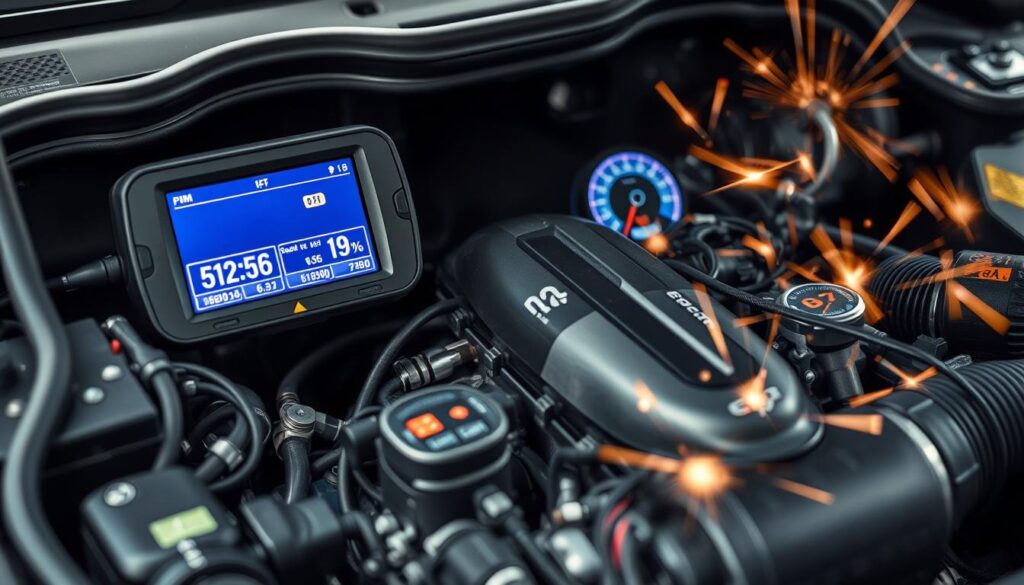
To keep our engine in great shape, we should do regular maintenance. This includes:
- Oil changes
- Air filter replacement
- Coolant checks
- Belt inspections
By following these steps and doing regularengine diagnosticsandengine health assessments, we keep our engine running efficiently. This also lowers the chance of expensive repairs.
| Maintenance Task | Frequency |
|---|---|
| Oil changes | Every 5,000 to 7,500 miles |
| Air filter replacement | Every 15,000 to 30,000 miles |
Common Misconceptions About Tune-Ups
There are many wrong ideas about engine maintenance. Knowing the importance of regular engine tune-ups and checks is key. It helps keep your car running well and lasts longer.
Some think tune-ups are only for old cars. But, car engine care is important for all cars, no matter how new or old. Regular tune-ups catch problems early, saving you from expensive fixes later.
Tune-Ups Aren’t Just for Older Cars
All cars need regular tune-ups. Whether it’s a brand new car or one that’s been around for years, engine maintenance is vital. It keeps your car running smoothly and lasts longer.
Fuel Injection Systems and Tune-Ups
Modern cars have fuel injection systems. These need regular checks during tune-ups. This makes sure they work right, boosting fuel efficiency and engine power.
Keeping up with importance of regular engine tune-ups and checks helps a lot. You’ll get better fuel economy, better performance, and a car that lasts longer. Remember, engine maintenance is a big part of car engine care.
| Service | Recommended Interval |
|---|---|
| Oil Change | Every 10,000 miles or as recommended by the manufacturer |
| Tire Rotation | Every 10,000 miles |
| Brake Pad Replacement | Every 25,000 to 70,000 miles |
Conclusion: Our Commitment to Car Care
Regular engine tune-ups and checks are key to a great driving experience. They improve engine performance, save fuel, and make our cars last longer. It’s a smart move for our vehicles’ health.
Studies from All Around Auto Repair show how important regular checks are. They prevent big problems and save us money. Keeping up with maintenance helps our cars run smoothly and safely.
By telling others about the importance of car care, we help our cars and the environment. Well-maintained engines mean less pollution. We’re all doing our part to keep our communities clean.
